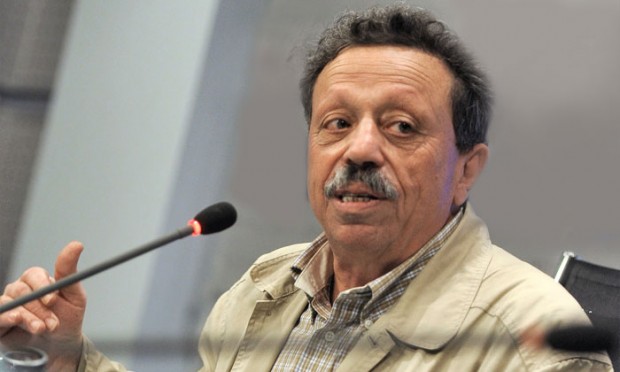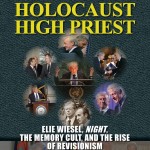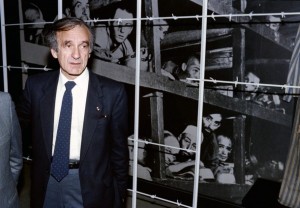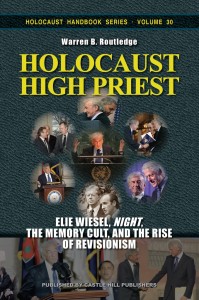Israel Shamir says “Wiesel was there.”
Tuesday, May 19th, 2015

Israel Shamir is a Russian-born Jew who converted to Orthodox Christianity. Norman Finkelstein said of Shamir: “He has invented his entire personal history. Nothing he says about himself is true.”
Warren B. Routledge, author of the new unauthorized biography of Elie Wiesel, Holocaust High Priest, has thankfully CORRECTED some statements made by Israel Shamir in an email to Michael Santomauro referring to my May 11 interview with Routledge. The Shamir comment was posted at Santomauro’s Reporter Notebook Yahoo Group.
Shamir wrote that he knew Wiesel had spent time in Auschwitz because “a good personal friend, a French writer Piotr Ravich (spelling?),” said he did. It doesn’t seem to bother Shamir that this is hearsay, nor that he doesn’t know the spelling of his good, personal friend’s last name! He made some other errors of fact in his email. Here is the full text:
From: <[email protected]> on behalf of Israel Shamir [email protected] [ReportersNotebook]
Sent: Thursday, May 14, 2015 1:00 AM
To: [email protected]
Subject: Re: Listen to The Heretics’ Hour Monday nightThere are many funny and dubious points about Wiesel, but he definitely was an inmate in Auschwitz. I had a good personal friend, a French writer Piotr Ravich (spelling?), who won the prix Goncourt. He committed suicide in 1970s, was a wonderful man, quite cheerful. So this Piotr Ravich had spent four years in Auschwitz, as much as anybody, and he knew Wiesel there. They belonged to the elite of the prisoners. Ravich was a translator and interpreter for the administration. Anyway Wiesel was there.
Mauriac played a very important part in Wiesel career, I do not know whether he lusted after him and I do not know whether Wiesel was a gay, but Mauriac’s Catholic faith played a very important part in the story. This is well described in many texts.
I next heard from Warren Routledge informing me that Shamir had made a number of errors in what he had written, and he, Routledge, intended to answer him. Here is Routledge’s response:
This is a follow-up to Israel Shamir’s friendly post in response to Frank Scott’s negative comments about my unauthorized biography of Elie Wiesel, entitled Holocaust High Priest.
I would just like to add a few comments to what Shamir wrote. His statement that his friend, Piotr Rawicz, “knew Wiesel there,” [Auschwitz] and the assurance he gives us that “Wiesel was there” [Auschwitz] are simply not true.
It is possible, however, that Wiesel and Rawicz could have met at some point, however briefly, after the war, when they had each established themselves in the mainstream media as Holocaust camp veterans within just a few years of each other.
Ravicz published his one and only novel Le Sang du ciel, a modernist work in the surrealist vein, in 1961, and received the Rivarol Prize (awarded to a writer born in a linguistic framework other than French) for it in 1962. Shamir also states erroneously that Rawicz received the highly-prestigious Goncourt Prize, which is not the case. Wiesel published La Nuit in 1958 and he also received the Rivarol Prize in 1963 for that work and several other short novels published in the early 1960s.
Each first novel was translated into English, Wiesel’s as Night in 1960, with another one, by his wife in 2006, which is discussed in great detail in my book. Likewise, Rawicz’s novel was translated as Blood from the Sky in 1964, with another, completely separate, translation in 2004.
Shamir states that Rawicz spent “four years at Auschwitz, as much as anybody,” yet Rawicz and his commentators actually only make claims for him being there for two years, from 1942 to 1944, when he was transferred to Terezin.
Rawicz, both in his novel, and in his later life as a literary critic in France, was always very vague, even elusive, about his time spent in Auschwitz. To my knowledge, he never divulged his ID number, date of arrival, block assignment, or other personal information relating to his work duties other than to say he served as a translator while there. In this regard, his friend, the British literary critic and author of the 2004 translation of his novel, Anthony Rudolf, has written of him: “Rawicz was the first to admit that his experience of Auschwitz was not the worst possible.”
What does this mean?
Such reserve is very strange indeed for someone whose career benefited immensely from his aura as a “survivor.” It also stands in opposition, by its prudence, to the outright mendacity and chutzpah of Wiesel who claimed in Night to have seen two massive flaming pits in close proximity to the main gate into which dump trucks were unloading living adults (Pit 1) and living children (Pit 2).
Rawicz’s “silence” about his claimed stay at Auschwitz was such that, before his suicide in 1982, he never described what his life was actually like there. Nor did he ever provide any eye-witness information about the alleged German policy of “extermination” there.
Warren B. Routledge
Category Featured | Tags: Tags: Auschwitz, Holocaust High Priest, Israel Shamir, Night, Warren Routledge,
Social Networks: Facebook, Twitter, Google Bookmarks, del.icio.us, StumbleUpon, Digg, Reddit, Posterous.




